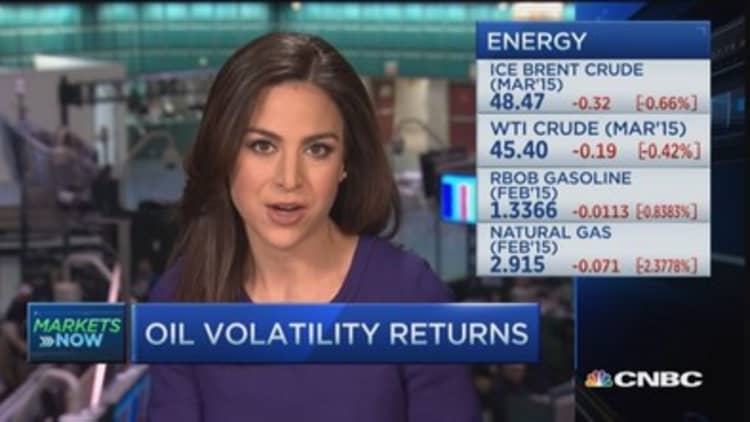U.S. oil prices ended lower Monday, ahead of the first big snowstorm this year in the country's Northeast, while benchmark Brent crude fell after pledges of no policy change by the top oil exporter Saudi Arabia after King Abdullah's death.
An 11-year high in the U.S. dollar against other major currencies, and fears of fresh instability in the euro zone after a decisive Greek election victory by the Syriza party also limited any potential rebound in oil, traders said.
Light snow began falling on the U.S. East Coast on Monday morning, the first signs of a potentially historic blizzard that officials predicted could dump up to 3 feet of snow in the coming day, snarling transportation for millions of people.
Read More Snow of 'potentially historic' proportions aims for Northeastern US
The National Weather Service issued a blizzard warning for New York City and surrounding areas between coastal New Jersey and Connecticut, beginning 1 p.m. EST on Monday and worsening overnight into Tuesday morning. It warned of two days of winter storms across the East Coast, from Pennsylvania to Maine.
"Crude is getting some help from supportive heating oil ahead of the blizzard, although with all the flight cancellations, it might end up being a bearish event on oil demand," said Phil Flynn, analyst at Chicago's Price Futures Group.
West Texas Intermediate crude for March closed down 44 cents, at $45.15 a barrel.
March was trading at $48.15 per barrel, down 63 cents.
U.S. heating oil rose 1.2 percent to $1.6656 per gallon.
Read More
Traders said crude was pressured somewhat by Friday's news that no time set for restarting a 90,000-barrel-per-day crude distillation unit at BP Plc's 413,500-bpd refinery in Whiting, Indiana. The unit was shut a day earlier for unplanned repairs, sources said.
Saudi Arabia's new king Salman pledged continuity in energy and foreign policies on Friday and was quick to retain veteran oil minister Ali al-Naimi, in a message aimed at calming a jittery oil market.
The Saudis were pivotal to OPEC's decision in November not to cut oil exports in order to preserve their market share amid a global supply glut that has more than halved prices since June.
In Monday's early trade, Brent and U.S. crude turned positive after Abdullah al-Badri, secretary-general of the Organization of the Petroleum Exporting Countries, said he thought prices may have reached their bottom. But the market slipped soon after.
Read MoreIt's downhill for US after Saudi king dies: Experts
"It was a bit of an overreaction from his comments," said Olivier Jakob, analyst at Petromatrix in Zug, Switzerland. "The only voice that counts is from Saudi Arabia."
"To have a meaningful market impact we need to see some signs coming out of Saudi Arabia that it will change," he said.

Long Positions Cut
Money managers cut their net long U.S. crude futures and options positions in the week to Jan. 20, the U.S. Commodity Futures Trading Commission said on Friday.
Oil services firm Baker Hughes published data on Friday that showed the number of U.S. oil rigs fell for a seventh straight week to 1,317, the fewest since January 2013.
Read MoreUS oil producers can't keep drilling at $45 oil: Pickens
Germany-based Commerzbank said that output would remain high in the short term but production from U.S. oil rigs would continue to dwindle in the coming weeks, eventually supporting prices.
"It is only a question of time before this is reflected in decreased oil production," Commerzbank analysts said in a note to clients on Monday.
"In our opinion, this indicates that prices will recover in the second half of the year."

